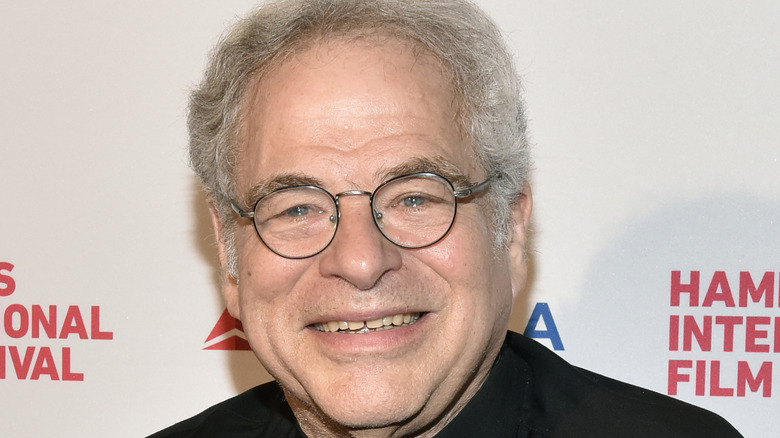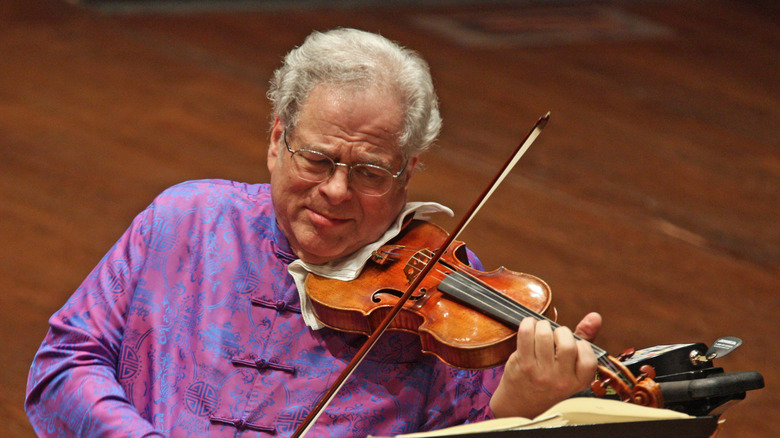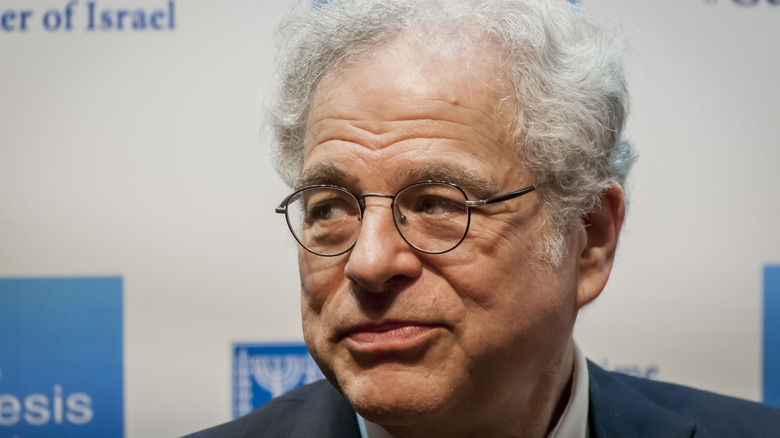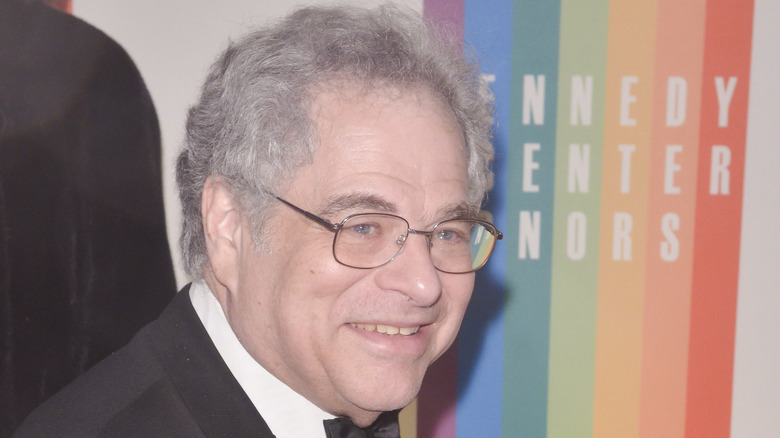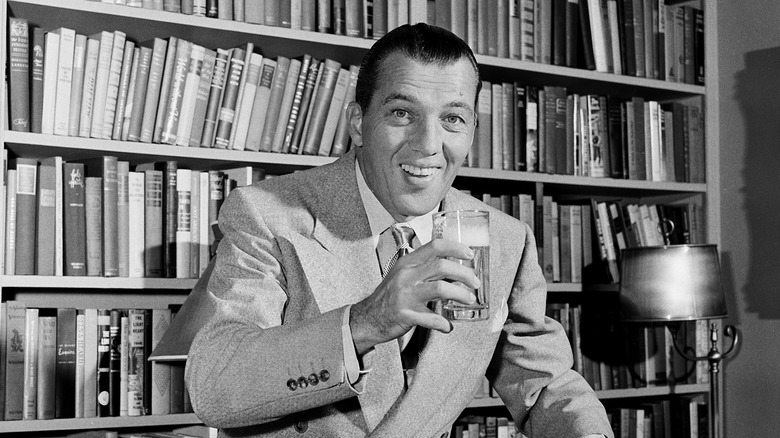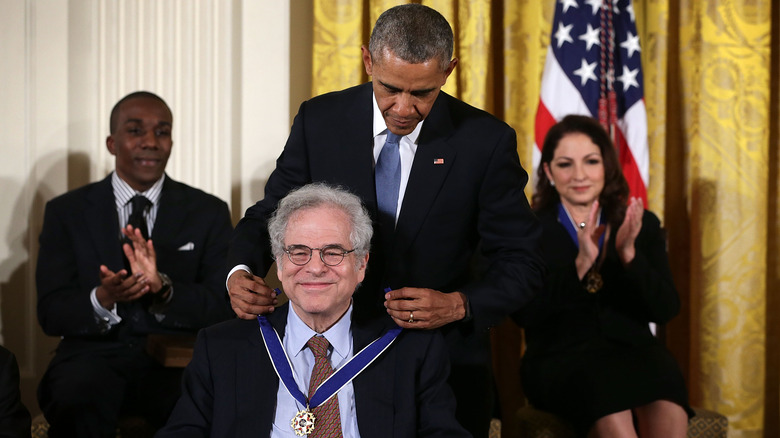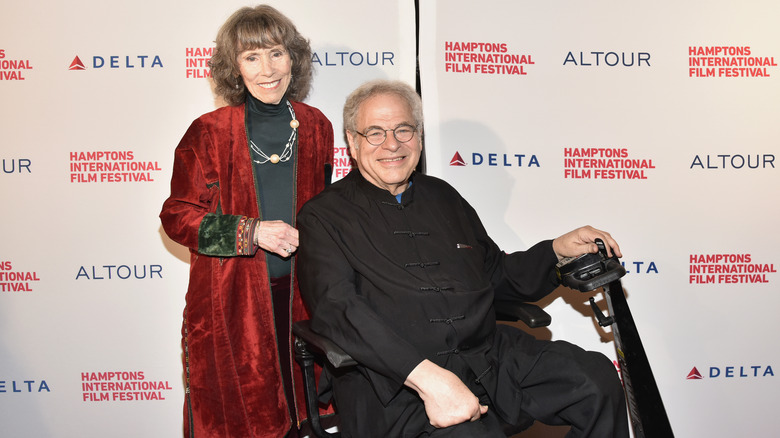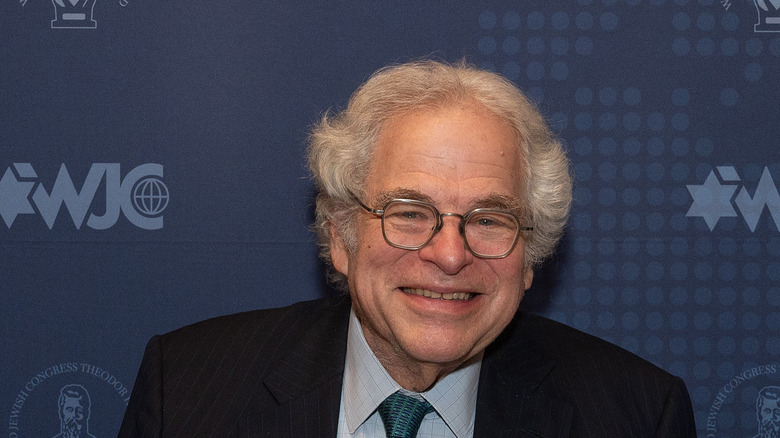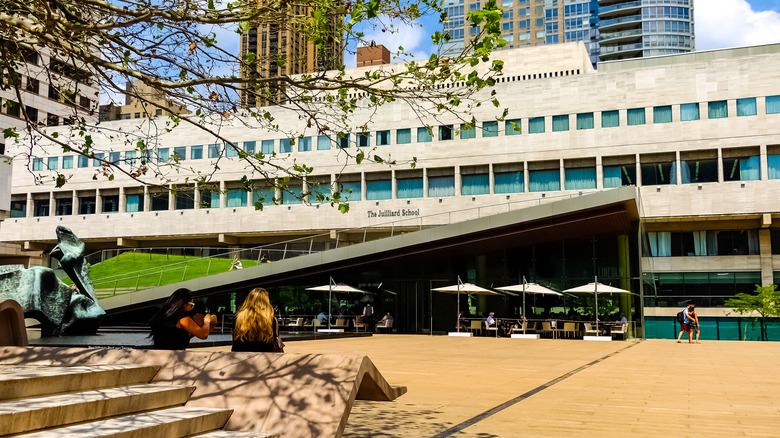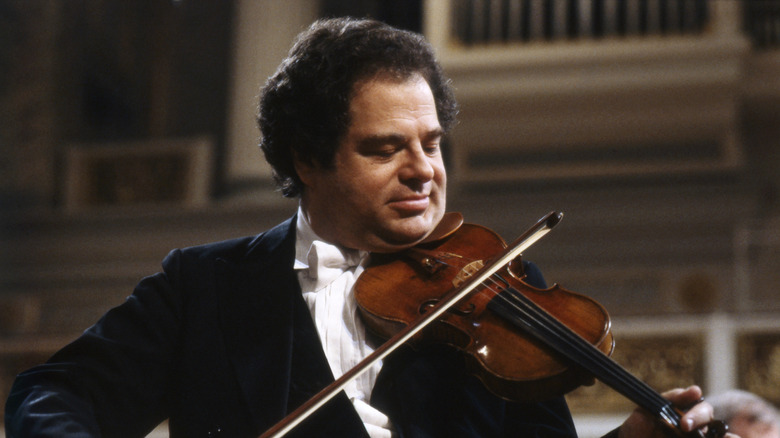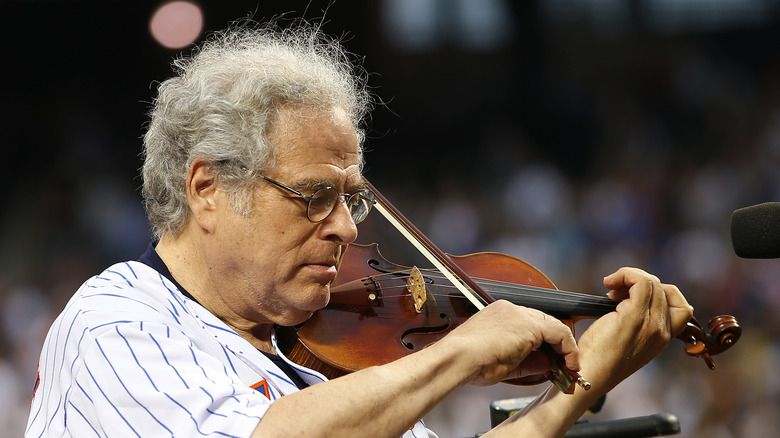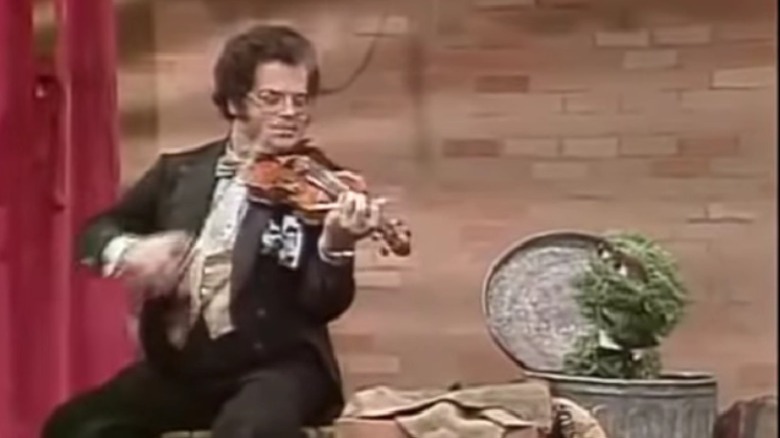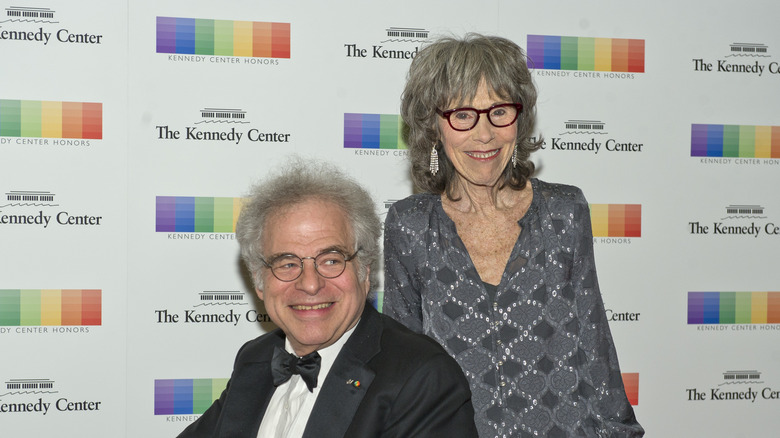Itzhak Perlman: 12 Facts About The Famous Violinist
If you like classical music, jazz, or klezmer (or music, really), then you've probably heard of Itzhak Perlman. After all, he has 16 Grammys, a Presidential Medal of Freedom, and a myriad of other awards and distinctions, as per the official Itzhak Perlman website. He is one of the greatest contemporary violin players (who has dabbled in many other instruments and musical pursuits) and a valuable teacher in music and life alike. He once said, "One of the most important elements in teaching, conducting and performing, all three, is listening."
Perlman survived a very tough childhood, pursued his dreams with utmost ferocity, fought disability biases, and chose to inspire others through his love for music. And to this day, Perlman is deeply moved by music — it's not a business but a way to have a meaningful life and a rich experience. As he said in the 2017 documentary "Itzhak," "I always feel, 'Am I not lucky to be able to be affected by music like that?' I consider myself lucky." So let's explore 12 facts about the famous violinist and let him inspire us through his love for music and joie de vivre.
He started very early
Many musicians who achieve greatness confess to picking up their favorite instrument early on. But in Itzhak Perlman's case, early on was very early on. As Britannica reports, Perlman first fell in love with the sound of violin on the radio, when he was just 3 years old. As soon as that happened, his parents took him to music school. This might have been their best decision — Perlman never put down his violin, even after a terrible illness left him without the ability to walk. If anything, this motivated him to be an even greater violinist. He soon enrolled in the Tel Aviv Academy of Music, and he had his first concert when he was 10 years old.
But as Perlman himself confessed in the 2017 documentary "Itzhak," his choice to play the violin was rooted in that moment when he was 3, and he liked its sound. In his opinion, this is how all musicians choose their instruments: "I think that what makes people want to play an instrument is what they hear in their head ... they like the sound." Perlman gave his own daughter as an example — she chose to play the flute simply because she liked the sound of it better.
He is a polio survivor
As per Britannica, Itzhak Perlman was only 4 years old when he contracted polio. According to the World Health Organization, polio is a viral disease that affects young children the most. It spreads from the intestines to the nervous system and can thus cause paralysis if left untreated. Sadly, Perlman did not receive the right treatment, as he remembers in the 2017 documentary "Itzhak: "I had to smell smoke, parchment with holy words, and then they would burn it and I would smell the holy words." It's easy to see how this did not cure his polio.
Perlman's friend, American actor Alan Alda, confessed to receiving the Sister Elizabeth Kenny polio treatment as a child, which involved painful massage and being wrapped up tightly in very hot blankets. Perlman didn't have any access to this kind of then-revolutionary treatment: He was born on August 31, 1945, in Tel Aviv, which was still a part of Palestine at the time. When he contracted polio, Israel had just declared its independence, as History reports. The economic situation and medical care in 1949 were therefore suboptimal, to say the least — Perlman was subjected to a religious ritual rather than medical treatment for a highly dangerous disease. He was thus left with a permanent disability in both legs. The silver lining? His hands were left unaffected, and he felt even more motivated to become a great violinist.
His parents made huge efforts to support him
As "Itzhak," the 2017 documentary about Itzhak Perlman's life and career suggests, Perlman's parents had a tough life. According to Encyclopedia.com, they separetely emigrated from Poland to Israel during the 1930s, and met and married in Tel Aviv, which still belonged to Palestine in the mid-1940s. This is when Perlman was born. During this time, his parents did a myriad of odd jobs to support their son and his desire to become a musician. "My father did anything to make a living, he learned how to be a barber ... They then washed clothes for the neighbors, you know. They adjusted what they did for a living to what they had to do for me," he said in his documentary. As being a violinist requires constant practice, Perlman's parents pursued jobs and moved to neighborhoods that enabled them to be close to a music school at all times.
Through an America-Israel Cultural Foundation scholarship, Perlman and his parents relocated to New York (via the Itzhak Perlman's official website). Once again, Perlman's parents changed their lives entirely in order to increase their son's chances of success in the music industry. As Perlman recalled in "Itzhak," several great violinists had heard him play back in Israel, but they primarily saw him as a crippled boy, albeit talented, who didn't stand a real chance at greatness. So his family worked hard to escape this kind of pessimism and bias, and try their luck in the United States — and it truly worked out.
The Ed Sullivan show was his big break
After arriving to the United States, Itzhak Perlman was soon lauded for his talents — in 1958 he appeared on the Ed Sullivan Show, as per Itzhak Perlman's website. As Sullivan himself stated on the show (via "Itzhak"), Perlman had already been recommended by violin greats Jascha Heifetz and Yehudi Menuhin. But according to Perlman and his wife, Toby, it wasn't Perlman's skills at the young age of 13 that inspired Sullivan to invite him on his show: "It was, you know, poor little crippled boy kind of thing ... in Sullivan's mind."
Nevertheless, for the first time in his life, thousands of people heard Perlman play, from all over the country. And his rendition of Felix Mendelssohn's Concerto in E Minor was truly astounding — as soon as Sullivan's show was over, Perlman had found nationwide fame. Of course, it was musicians and music teachers who noticed him the most. As NPR reports, Dorothy DeLay, who went on to be Perlman's teacher at Juilliard, commented, "[He was] on a kind of creative high that has never let up." The Ed Sullivan Show was the beginning of Perlman's musical education in the U.S.
This auspicious start was also the beginning of his long and successful career. He shortly began touring with Sullivan's Caravan of Stars, traveling the states for two months. Several years later, Sullivan brought him back to his stage in 1964 to perform Henryk Wieniawski's Second Violin Concerto. A year later, Perlman recorded his first album.
He received a Presidential Medal of Freedom
As per Izthak Perlman's official website, in 2015, President Barack Obama awarded Perlman a Presidential Medal of Freedom. During his speech, Barack Obama said (via "Itzhak"), "What truly sets him apart and what makes him perhaps the most beloved violinist of our time is that he approaches music the way he approaches everything in life: with passion and with joy." Indeed, both Barack and Michelle Obama are big fans of Perlman's for this reason. Throughout Barack Obama's presidency, Perlman was repeatedly a guest of the White House — a notable event was his 2012 White House concert for Israeli president and Presidential Medal of Freedom honoree Shimon Peres.
Barack Obama further explained why he believes Perlman is one of the world's greatest violin players: "He lays bare the soul of a piece, making us feel each note and giving us a glimpse of something bigger than ourselves, and by doing so, he makes the world a little more beautiful." But the former president wasn't the only political figure to recognize Perlman's value in the musical world. In 1986, Perlman received a Medal of Liberty from President Ronald Regan, and at the turn of the 21st century, President Bill Clinton awarded Perlman a National Medal of Arts. Barack Obama's Presidential Medal of Freedom only came as a culmination of a universally acclaimed life and career.
Itzhak and Toby Perlman are a solid team
Toby and Itzhak Perlman have known each other for a lifetime. As Toby confesses on the 2017 documentary "Itzhak," she fell in love with her future husband when they were both in high school. But Itzhak didn't feel the same way at first — in fact, he had a relatively long-term relationship with somebody else first, even putting his friendship with Toby on hold. But after his first relationship ended, Itzhak became very close to Toby once more, and it all culminated after one of his college concerts: "Itzhak was playing on one of the student concerts that Sunday night, he played ... Ravel's 'Tzigane.' And I went backstage and I asked him to marry me."
The Perlmans have been married for over half a century, and they are as strong a team as always. According to Toby, she is consistently critical with his violin playing and therefore acts as his right hand, counselor, and best buddy in his career.
He has a myriad of awards
Itzhak Perlman's official website explores the full list of awards and recognitions the famous violinist has, thus giving an accurate impression of Perlman's importance in the classical music world. First and foremost, Perlman has won 16 Grammy Awards — his first award was in 1977, for Best Instrumental Soloist(s) Performance (with orchestra) of Antonio Vivaldi's "The Four Seasons." The following year, he received two more, and in 1980, he received four Grammys. He already had 10 Grammys in 1986, when President Ronald Reagan awarded him the Medal of Liberty. During the 1990s, Perlman also received four Emmys, for musical programs such as the PBS documentaries "Fiddling for the Future" and "In the Fiddler's House" (the latter of which explores Perlman's contributions to klezmer music).
In 2005 Perlman received the Golden Plate Award of the American Academy of Achievement, and soon after he received a Grammy Lifetime Achievement Award. But Perlman didn't limit himself to musical awards (and the many presidential medals). He is deeply involved in the academic world, too, making contributions to sectors such as philosophy and science. In 2002, he became an elected member of the American Academy of Arts and Sciences, and he is also a member of the American Philosophical Society. Perlman also has honorary degrees from Harvard, Yale, Brandeis, and Roosevelt universities (among others), and an honorary doctorate at Juilliard School, which once shaped his future as a world-acclaimed musician.
Itzhak Perlman studied at Juilliard School
Soon after Itzhak Perlman played on the Ed Sullivan Show, he began his studies at Juilliard, where he was noticed by top classical music teachers there: Ivan Galamian and Dorothy DeLay (via Perlman's official website). DeLay remembers Perlman being initially reluctant to play for her — he still felt like a stranger in New York, living in very poor conditions and barely speaking English, as per "Itzhak." But after he played a complicated Mendelssohn concerto in double tempo with the least effort (all the while frowning at his potential professor), DeLay recognized his immense talent, and she became a mentor to Perlman, in every way possible.
Itzhak Perlman and his wife Toby Perlman remember DeLay's methods fondly — she simultaneously taught him violin and being independent as a person, taking Itzhak to museums and hiring an art teacher to visit him regularly. "She understood that art is a reflection of the artist and if there's nothing going on up here, maybe not much will go on [with the violin]," said Toby Perlman. Although both DeLay and Galamian taught at Juilliard, Itzhak remembers they had completely different methods — in fact, DeLay was the only teacher who taught him how to question everything and think for himself (rather than copy the professor). Today, Itzhak teaches by DeLay's method.
He's a musical jack of all trades
Indeed, Itzhak Perlman is primarily known as a famous violin player, but throughout his career, he has dabbled in many an instrument. As per his official website, his main side affair is being a world-renowned conductor: He led the New York Philharmonic, Philadelphia Orchestra, Chicago Symphony, Los Angeles Philharmonic, Boston Symphony, National Symphony, San Francisco Symphony, and many other orchestras such as Houston, Seattle, Montreal, and Toronto. Throughout the 2000s, he also acted as musical advisor and guest conductor for several symphonies in the United States. He's also stepped out of the country as conductor and led the Israel Philharmonic, Berlin Philharmonic, Royal Concertgebouw Orchestra, London Philharmonic, and English Chamber Orchestra.
And when it comes to his violin, Perlman doesn't limit himself to classical music, even though it's through the classical masters that he earned his name. Perlman enjoys playing klezmer, the Ashkenazi Jewish traditional music of Eastern Europe. In 2012, Perlman appeared alongside singer Yitzchak Meir Helfgot in the Sony documentary "Eternal Echoes: Songs & Dances for the Soul," which, along with PBS' "In the Fiddler's House," celebrates klezmer traditions. As per Britannica, Perlman also left a mark on jazz music and played the violin on famous film scores. In fact, his most listened song on Spotify is the main theme from "Schindler's List."
His 70th birthday was a big deal
On August 31, 2015, Itzhak Perlman turned 70, and even for a busy musician, it was a busy year. As per his official website, Perlman celebrated his 70th birthday by releasing three albums, all quite different from one another: a Deutsche Grammophon album with pianist Emanuel Ax performing Fauré and Strauss Sonatas, and two huge box sets — one containing all of Perlman's Deutsche Grammophon and Decca discography, and "Itzhak Perlman: The Complete Warner Recordings" (containing a whopping 77 discs).
Also in 2015, Perlman was invited by President Barack Obama to the White House, to receive his highest award yet — the Presidential Medal of Freedom, as per his world-acclaimed documentary "Itzhak," directed by Alison Chernick. While Perlman was filming for the project, he was still celebrating. The documentary begins with Perlman descending from a vehicle and wearing his "Perlman 70" Mets shirt, right before he performed the National Anthem at their 2016 game against the Giants, as per MLB.com — which only goes to show that, for him, his 70th birthday was the perfect opportunity to sit, look back, and celebrate his life and career.
He's had a prolific TV career, too
Itzhak Perlman has been featured in a myriad of music documentaries that follow his playing, his teaching, or both. But Perlman did all he could to bring his love for music and culture to all those who enjoy watching TV. This is why he appeared on shows such as "Sesame Street." In this episode, Perlman teams up with Oscar the Grouch, who plays the vacuum cleaner and a car horn, among other things (Perlman plays the violin, as well as his nose). It's easy to see how Perlman became a beloved musician for people of all ages, backgrounds, and affinities.
According to his website, Perlman also appeared on "The Tonight Show," "The Late Show with David Letterman," and, more recently, on "The Late Show with Stephen Colbert," where he performed a two-song medley with Jon Batiste on piano. But Perlman also appeared on cooking shows, such as Jacques Pépin's "Artist's Table," where he shared his love for food and music and argued that the two go hand-in-hand quite well. After all, he once told Barack Obama that his favorite sound was onions sizzling in a pan (via "Itzhak").
Itzhak Perlman has a special relationship with music
Throughout the 2017 documentary "Itzhak," Toby and Itzhak Perlman make one thing clear: Music moves you and makes the world a better place. Perlman never ceases to be deeply affected by the music he listens to — it has never become a job, nor does he want to get used to it. In fact, he considers himself to be among the very few lucky ones that can feel and convey so much with music. Perlman also confessed that a big layer of his music's depth is owed to his commitment to teaching. As Juilliard School confirms, Perlman teaches violin and chamber music to college students (he also gives regular talks and lectures outside Juilliard). Perlman commented, "When you teach others, you teach yourself ... My playing has taken a different kind of meaning because I'm basically teaching myself at all times."
Perlman also noted that he feels like he reacts to the music he hears (rather than creating music from scratch) — "Am I not lucky to be able to be affected to music ... to listen to something and be so moved." From the quote offered by Perlman's official website, it's clear just how rich his creative world is: "Another thing that you really do when you play, that you're supposed to do, is colors. You know, you cannot play with one color." From synesthesia to joie de vivre, Perlman uses his violin to teach the world how to make their lives a little more meaningful.
